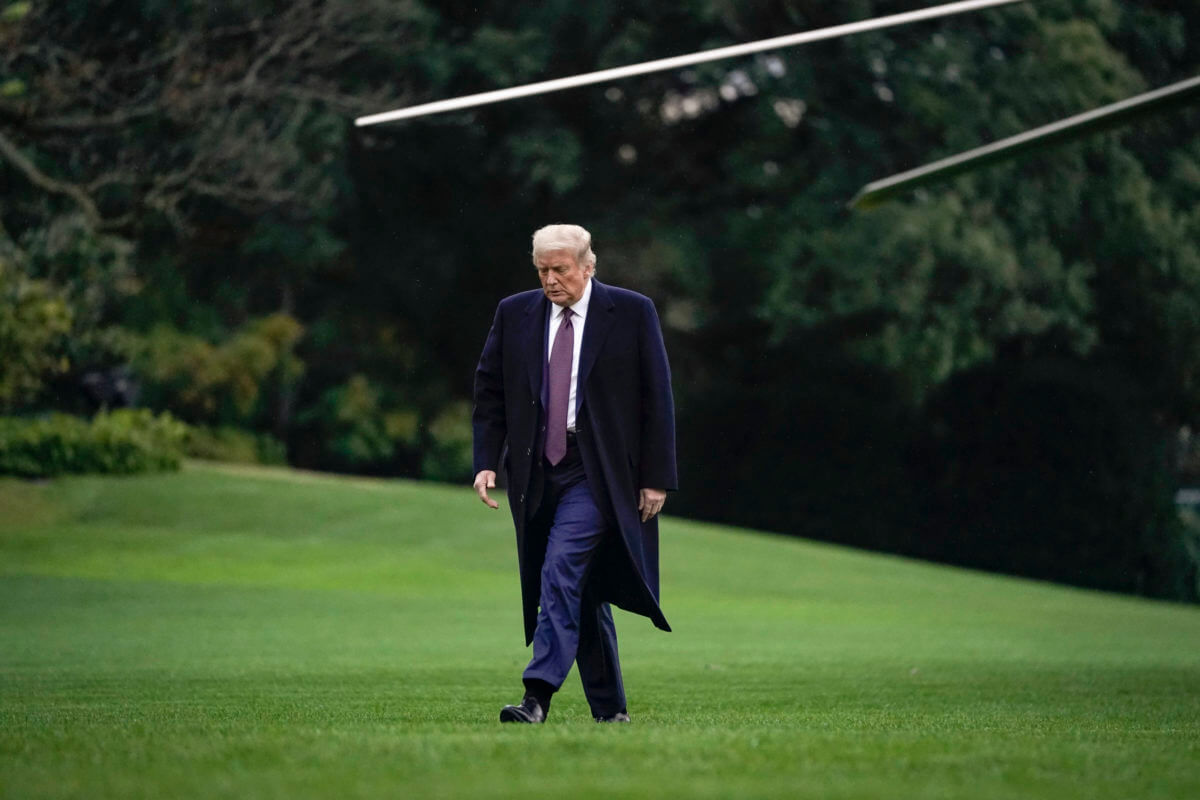
President Donald exits Marine One on the South Lawn of the White House on October 1, 2020 in Washington, DC. (Photo by Drew Angerer/Getty Images)
The 25th Amendment explains what happens if the president can’t lead the country. And party committees control what happens with presidential nominations before Inauguration Day.
President Donald Trump tested positive for COVID-19 early Friday morning after months of downplaying the virus and most recently mocking Democratic nominee Joe Biden for taking precautions like wearing a mask. The news produces plenty of questions about what happens next.
The coronavirus can be unpredictable, some individuals who come down with the virus are bedridden for days even though they have no additional risk factors, while others are completely asymptomatic. But Trump has several risk factors that make him more likely to experience a more severe form of the disease, including his age and weight. So what happens if Trump is too sick to act as president? That’s where the 25th Amendment of the Constitution comes into play.
What is the 25th Amendment?
The 25th Amendment explains what happens and who takes over if a sitting president is incapacitated or passes away in office.
There are several different scenarios. If the president themselves determines they are unfit to lead temporarily but will later return to their duties in office, they can inform, in writing, the House speaker and Senate president pro tempore, currently Rep. Nancy Pelosi and Sen. Chuck Grassley. While the president is away, the vice president steps in and serves as acting president. Then, when the president is ready to resume duty, they would send a similar message, again in writing, notifying the leaders.
Other world leaders have not been spared the effects of the coronavirus. United Kingdom Prime Minister Boris Johnson was hospitalized back in April, he placed his duties in the hands of his foreign secretary until he was able to regain his position.
When was the last time the 25th Amendment was used?
A temporary change in leadership has happened before. In 1985, President Ronald Reagan underwent cancer surgery and placed Vice President George H.W. Bush temporarily in charge. President George W. Bush invoked the amendment twice, in 2002 and 2007, when he underwent routine colonoscopies, according to NPR.
What if the president can’t–or won’t–invoke the 25th Amendment?
There are, of course, situations in which the president is unable to declare his incapacity. In that case, the vice president and a majority of Cabinet secretaries would inform the House speaker and Senate president pro tempore, and the vice president would step in temporarily. The president would resume his duties after he informs the proper parties in writing that “no inability exists.”
An even more complicated scenario would arise if the president refuses to acknowledge that they are incapable of carrying out their duties. If this happened, the vice president and a majority of the cabinet secretaries must declare the president incapable in writing. Congress must then convene within 48 hours, and has 21 days to rule on the issue. Congress must reach a two-thirds majority in both chambers to declare the president is unfit to perform his duties. Without that, the president remains in power.
What if the president and vice president are both sick?
One final scenario that is worth explanation is if the president and vice president both fall ill and are incapacitated.
In situations like this, the chain of command gets messy. Under current law, if both the president and vice president are unable to serve, the presidency would pass to the Speaker of the House, now Rep. Nancy Pelosi. This would hand the White House to a different political party without a formal election. A series of events like this would certainly lead to legal challenges, which would add additional uncertainty at a time when America needs it the least.
What happens to the election if a nominee leaves the ticket or dies?
If a candidate dies or leaves office after a party convention but before the election, a study from the nonpartisan Congressional Research Service says the individual party’s rules would apply. In 2016, Democrats’ rules would have the Democratic National Committee select a replacement, while Republicans would have the Republican National Committee select a candidate or reconvene a national convention.
If the candidate dies or leaves the ticket between Election Day and when the electoral college formally meets on December 14, party rules would still apply. And lastly, if the candidate leaves or dies between the electoral college meeting and Inauguration Day–January 20, 2021–the report found most “scholarly opinions” say the 25th Amendment would be in effect.
Politics

Youngkin, Democrats to start over on budget talks
The Republican governor stood with Democratic leaders in the General Assembly on Wednesday in a bid to ease tensions over their budget debate....

VIDEO: Domestic abuse victims speak out against the gun law bills Gov. Glenn Youngkin vetoed
Senate Bill 47 and House Bill 46 aim to close the loophole that allows offenders to transfer their firearms to someone else instead of relinquishing...
Local News

Virginia verses: Celebrating 5 poetic icons for National Poetry Month
There’s no shortage of great writers when it comes to our commonwealth. From the haunting verses of Edgar Allan Poe, who found solace in Richmond's...

Join the fun: Recapping Family Literacy Night’s storybook adventures
When’s the last time you read a book aloud with a loved one? If it’s difficult to answer that question, then maybe it’s time to dust off that TBR...




